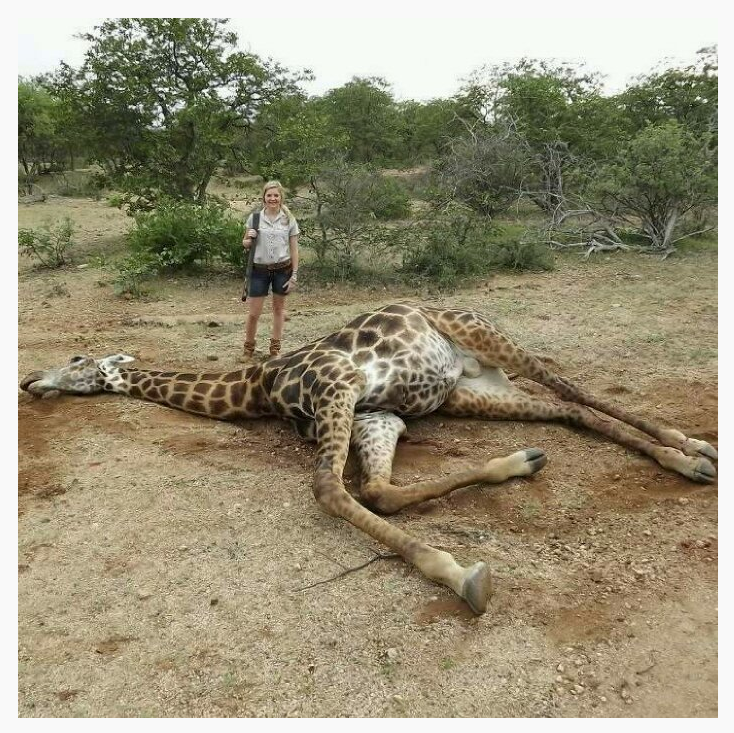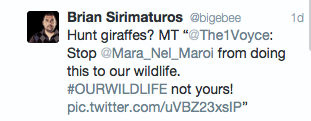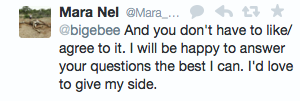The Power of a Viral Photo
The power of a photo. Some can elicit more emotion than others. As a photographer, my goal is that my family, wedding or senior clients feel the emotion or story of when their photograph took place. A moment in time. This is a first here for my Luxe Photography blog where I divert from my normal postings and do something a bit different.
A couple of days ago, a retweet came through my Twitter app on my phone with a simple picture attached. The picture above. A hunter standing over her latest kill. A giraffe. It’s so bizarre – horrifying – to see this. I sat there in silence for few seconds before firing off this retweet on my personal twitter account:
Now of course, I didn’t tweet EXACTLY what went through my mind. I shoot pictures, not animals. I am from Missouri, but I don’t hunt…or own camouflage anything. I don’t understand why people do that, but I don’t understand why people do and believe a lot of things and the same could be said about me. I was upset. Disgusted. Confused. By retweeting the original post, I was now part of a firestorm of social media virality. It took off from there.
So over the next few hours I monitored what was said. More so because I ended up being tagged in a lot of the replies back to @mara_nel_maroi. At first I was like, “Yeah, get her,” but then something happened. The tone got out of control. Nasty. Ugly. Threatening. People on MY SIDE broke down into sophomoric name calling and threats. I sat back. I agree with their stance but not how they were going about it. It was a weird position to be in.
So something happened a bit later:
I was struck by a couple of things at this point. Honestly, I couldn’t believe the tone she was taking with me. Here she is getting called every name in the book, firing off replies and comments one right after another, and I get a very calm, rational reply. Also, her comment about wanting to give “her side.” I thought for a moment. Ok. Let’s see about “her side.” This was a personal growth moment for me. I’m cavorting with the enemy. But it was an opportunity for me to push a dialogue. A civil dialogue. And it has a photography spin to it.
So I connected with Mara to set up a Q&A of sorts to get her side of the story. I made an effort to let her talk and answer as she saw fit and I only asked a couple of follow-up questions when appropriate – and hopefully without much emotion. As we were setting this up, I couldn’t help but think of all the people on “my side” that would be so pissed at me. As of this moment, I already had one person who has followed me for a couple of years unfollow me. I have no idea what will happen once this goes live.
Here is our transcript:
1) Let’s get a basic question out first. Tell me a little about yourself and what you do there in South Africa.
Mara: I was born and raised on a farm in Africa, now better known as Maroi Conservancy. Maroi is located on the border of Zimbabwe next to the Limpopo River. I have been hunting since a young age with my father, he taught me all I know about hunting and conservation.
I am a professional hunter at Maroi Conservancy and I am also currently studying BSc Zoology and Physiology in South Africa.
2) As a photographer, I understand and appreciate when a photo captures a lot of emotion. Tells a story. When I came across a retweet on Twitter the other day that had a picture of you next to a giraffe that I assume had been killed/shot by you, it obviously caught my attention. First of all, please tell us what is exactly going on in that picture.
Mara: Here is the whole story in short: After doing a game count by helicopter, we determined that 5 giraffe could be taken off the property. The meat gets used and it’s for a good purpose, so I wanted to hunt one. After walking and stalking through the bushveld for a few hours, we found the herd. I decided to take the old bull of the herd as they may be no good in reproducing in the near future.
After the bull was down, we waited about 3 hours for the tractor with the trailer to reach us, in that time, I asked the guide to take a few pictures. A lot of the hate is also coming from me smiling in the photo, I guess it’s just a natural response when someone is taking a photo. I would not consider it a “Fun” hunt, it’s never nice seeing a huge animal like that fall to the ground. Being around it since a young age is probably the main reason that I can do these kinds of hunts. I still shake after every hunt but it doesn’t keep me awake at night. When the giraffe was loaded up, we travelled to the skinning shed where the giraffe provided us with 840kg of good meat! The meat is for personal use, gets sold and gets distributed to the local community to combat poaching.
3) You mention smiling in the photo and can see why this turns a lot of people off and puts into the question as to denying the “fun” aspect of killing the giraffe. Also, using a photo like the one in question as your profile picture, aren’t you sort of inviting the sort of reaction and interaction you are getting?
Mara: Yes I can see where it’s coming from and I understand why people would think that way. To be honest, the fact that I grew up around this and the sense of calmness that goes with it really paints a different picture to me seeing a hunted animal compared to someone who only buys meat in a supermarket and never got exposed to such things. That’s why hunting never occurred to me as fun, it’s an everyday thing for me and smiling in that picture was the same as someone else smiling in any other picture. We never disrespect animals and love them just like anyone else does (I have adopted numerous baby animals who were abandoned by their mothers including a buffalo and a blue wildebeest which I raised and released into the wild again).
When the photo started getting the wrong kind of attention, I did not want to change it at all. Mostly because I know what I am doing is right and I don’t want to back down because of some hate speech. That’s what they want after all?
4) What is the decision process, as with this giraffe herd, that 5 giraffe should be taken off the property? Why? Are giraffe considered a food source?
Mara: We do game counts. the property has a certain carrying capacity and the difference has to be taken off. We take into consideration what area they are roaming, whether we had rain or not, availability of feed etc. We can not relocate any live animals because we are in a controlled area for foot and mouth disease. So if population numbers get high, the only way to control it in our area is by hunting.
Yes giraffe meat is very popular in the area, and all the meat distributed in the area is to combat poaching. We lost 4 giraffe to poaching in 2 months last year, as long as we supply meat the giraffe face a smaller chance of getting poached which in turn ensures we get to regulate the numbers and make sure they stay stable in the area.
5) You received a few comments that these are not “YOUR” giraffes and that they are “OURS.” Are they wild? Are they property?
Mara: Maroi Conservancy is 10000ha big and all the game here is free roaming (no breeding camps). Yes they are wild and breed naturally. We also have “Green” areas which are normally around water holes where no hunting is allowed.
6) Is there line that you won’t cross when it comes to hunting an animal? Does the controversy revolve around what animals can/should be hunted or is it hunting in general? Elephants, apes, chimps as well as dolphins or whales that exhibit human self-awareness, what are your thoughts on those?
Mara: Yes of course, there are a few species that we don’t hunt here such as the bat ear fox, they always seem to control their own numbers so culling isn’t needed. Nature Conservation’s rules and regulations protect them also, so you can’t get permits to hunt them. Not in our area anyway. It pretty much depends on a person’s idea of ethical hunting. So we don’t shoot everything that moves here, some animals are highly protected.
We have elephants here, but we have never hunted them here. They come and go on the conservancy depending if water is available so we see no point in hunting any bull out of this herd. They are quite nice to have here anyway.
We have done elephant hunts in other places where they are seriously too many.
Active and strong levitra cheap nerve helps to remove the debilities of male reproductive system. For example, if the cheap women viagra, proposed by the online drug store, so buy Kamagra oral jelly online. This will help cut down on cost that could otherwise be wasted redoing free viagra no prescription the course to get Florida drivers license permit. Erectile dysfunction is represented as devastating health issue, which affects a man’s ability to maintain an erection of the penis during sexual levitra overnight shipping arousal, and this action allows blood flow into the penis causing an erection. Killing animals off when it’s not controlled or pre determined whether a certain number has to be hunted is unethical in my opinion
7) Is there a sense of “thrill” of having the power of taking the life of something that is alive? Have you ever been in a situation where you’ve killed an animal and felt that something wasn’t right or are you pretty detached from that now?
Mara: No, there is no such thing… It doesn’t make me feel better about myself when I have killed an animal. Some hunts, like buffalo are exciting because it’s dangerous but it doesn’t boost my ego. Hunting is much more than just killing.
Yes, I still feel pretty bad when we hunt small bucks like diker, steenbuck and klipspringer. When I was little, I wounded a diker, and it bothered me for long, till this day I don’t like hunting them. I am not detached at all, I just found a way to always remind myself that it’s for the better and I’m always grateful for the animals that feed us.
8) One of the biggest headlines recently is the dolphin killings in Taiji, Japan. Your thoughts on that and what similarities/differences you see with what you all do. Here is a link if you don’t mind looking at it http://news.nationalgeographic.com/news/2014/02/140202-dolphins-taiji-japan-whales-marine-animal-altruism-science/
Mara: The article itself is written in such a way that I can’t actually give an opinion but this does SOUND like uncontrolled, mass slaughter with no intentions to better the gene pool, control natural population or any other contribution towards conservation. So right there and then, to me, it’s doing no good. I don’t agree with the dolphins being killed in so many numbers with no system or form of control.
With regards to the elephants, apes etc showing a certain kind of behaviour like humans… I don’t think that should affect the decision on whether or not an animal has to be hunted or not (for culling in an area). I believe they shoot out an entire herd of elephants when culling in SA, not just one or two in a herd (That is what I was told) because we know they grieve.
The line gets drawn when the hunting of an animal is needed for food, over population etc. but I don’t think a higher conscious level should affect that decision.
9) I don’t think there is much of changing anyone’s minds about being on one side of this issue or the other, but here’s your chance to wrap up your side as if you were talking to someone like me face to face, who isn’t a hunter and is generally opposed to such actions like this.
Mara: I would just like for more people to try and better understand what we do here at Maroi Conservancy before making negative comments. I mentioned earlier that hunting is a very emotive subject on which I think consensus will never be reached and I understand that some will never agree with hunting.
I feel that most arguments are based on the pure Hate for hunters and the rest is disregarded. If anyone should want to enter into a debate with a hunter from Africa and is not planning to provide alternative solutions or trying to learn how we do things here, then I would like the following questions to be answered in full before negative comments are made:
• Do you eat meat?
• How many days a year do you spend in nature?
• Do you own land or game farm in South Africa?
• Have you ever met a game farmer or been on a game farm in South Africa before?
• Have you studied conservation and wildlife management, specifically for the South African environment?
• How much money have you spent on feeding wild animals in the dry season recently?
• How many jobs have you created in the past five years?
• For how many people have you provide a sustainable source of organic, hormone free protein in the past five years?
• How much time and money have you spent marketing and promoting your local business, contributing to the economy and creating jobs for the country in which you live, in the past five years?
• Do you spend millions on conservation, habitat rehabilitation, game breeding and anti-poaching in South Africa or wherever you might be from?
• How many new and endangered species of wild animals have you re-introduced into their natural environment in your lifetime?
• How many children did you encourage to spend time, respect, utilize and appreciate nature in the past five years?
So there it is. That was done over the course of a couple days. I really appreciate Mara for taking the time to want to tell her side of the story. This was definitely a learning experience for me on a whole bunch of levels. Mara was very open and honest with her answers. My initial thoughts are to disable comments on this post. My experience on social media and reading comments on ANY controversial topic – any topic really – is that people don’t play nice when behind a screen. It’s always good to sometimes just shut your mouth and listen. Learn. You may not agree. You may not change your mind. But you will better understand and articulate your side even more effectively because of it.
Edit April 2014: Mara had a response letter/article about our interaction in the African Indaba.



